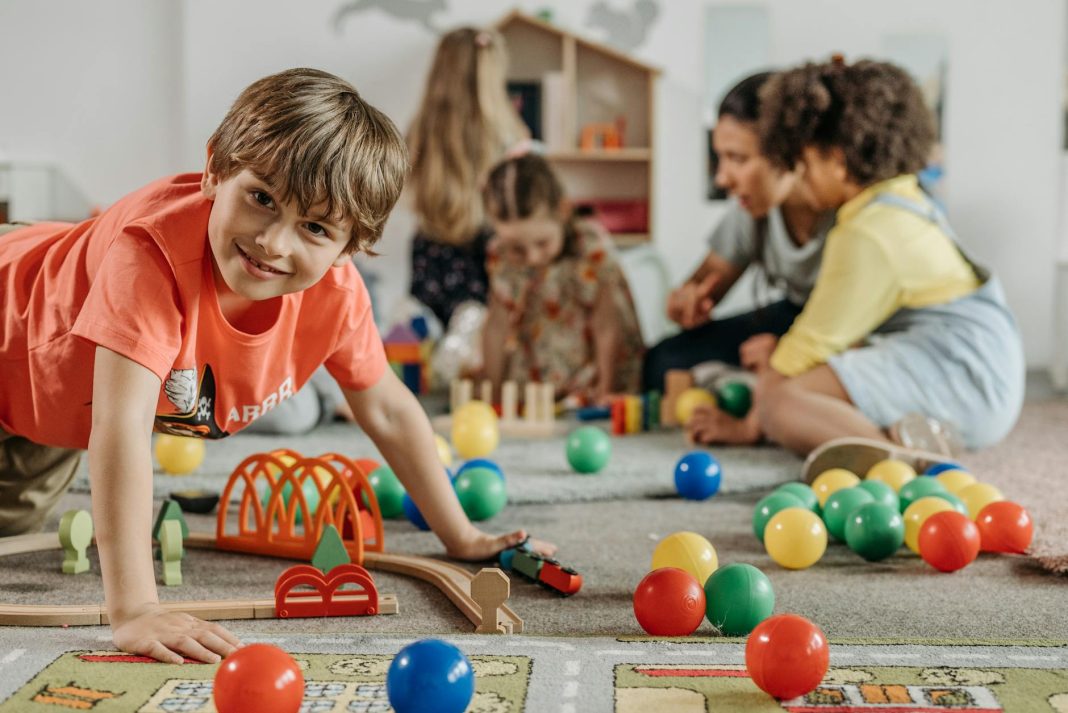Ah, das Kleinkindalter. Eine Zeit des explosiven Wachstums, der grenzenlosen Neugier und... seien wir ehrlich... einer ganzen Menge Drama. Wenn Sie knietief im Wirbelwind von kleinen Menschen, anspruchsvollen Snacks und epischen Nervenzusammenbrüchen stecken, sind Sie nicht allein. Dies ist keine Anleitung, die Ihnen ein perfektes Verhalten Ihres Kindes verspricht (denn das gibt es nicht!), sondern eher ein freundlicher Leitfaden, der Ihnen hilft, die üblichen Herausforderungen zu meistern und die unglaublichen Meilensteine dieser Phase zu feiern.
Der Wutanfall-Tango: Wutanfälle verstehen und bewältigen
Seien wir ehrlich: Wutanfälle sind das Lieblingsmittel von Kleinkindern, um Frustration, Erschöpfung oder überwältigende Gefühle auszudrücken. Bevor Sie zur Notfallschokolade greifen, denken Sie daran: Wutanfälle sind entwicklungsbedingt. Ihr Kind lernt gerade erst, seine Gefühle zu regulieren, und manchmal ist der einzige Ausweg eine regelrechte Gefühlsexplosion.
Was können Sie also tun?
- Bleiben Sie ruhig: Leichter gesagt als getan, aber wenn Sie den Kummer Ihres Kindes spiegeln, wird die Situation nur noch schlimmer. Atmen Sie tief durch und versuchen Sie, neutral zu bleiben.
- Bieten Sie Trost, keine Lösungen: Eine feste Umarmung und ein leises "Ich weiß, dass du wütend bist" können viel bewirken. Vermeiden Sie es, Ihr Kind während des Höhepunkts des Wutanfalls zu belehren oder mit ihm zu diskutieren.
- Ignorieren Sie das aufmerksamkeitsheischende Verhalten (wenn es sicher ist): Manchmal sind Wutanfälle ein Weg, um Aufmerksamkeit zu bekommen. Wenn es nicht gefährlich ist, kann das Ignorieren des Verhaltens (während man in der Nähe bleibt) überraschend effektiv sein.
- Schaffen Sie einen sicheren Raum: Richten Sie eine ruhige Ecke oder einen Raum ein, in den Ihr Kind gehen kann, um zu deeskalieren, wenn es sich überfordert fühlt.
- Verhindern Sie künftige Wutanfälle: Planen Sie mögliche Auslöser (Hunger, Müdigkeit, Reizüberflutung) ein und gehen Sie proaktiv darauf ein. Eine einheitliche Routine und klare Erwartungen können dabei helfen.
Disziplinierung: Leiten, nicht bestrafen
Bei der Disziplinierung geht es nicht um Bestrafung, sondern darum, Ihr Kind zu positivem Verhalten anzuleiten. Kleinkinder lernen noch, was richtig und was falsch ist, und konsequente, altersgemäße Disziplin ist der Schlüssel dazu.
Zu den wirksamen Disziplinierungsstrategien gehören: Kleinkindalter: Ein wilder Ritt, aber wir haben es im Griff!
- Positive Verstärkung: Konzentrieren Sie sich darauf, gutes Verhalten mit Lob, Aufklebern oder kleinen Privilegien zu belohnen. Dies ist weitaus wirksamer als eine reine Bestrafung.
- Auszeiten (bei angemessener Nutzung): Eine kurze Auszeit (eine Minute pro Lebensjahr) in einem ruhigen, sicheren Raum kann dem Kind helfen, wieder zur Ruhe zu kommen. Sie sollte nicht als Strafe, sondern als Gelegenheit zur Beruhigung genutzt werden.
- Natürliche Folgen: Lassen Sie Ihr Kind die Konsequenzen seines Handelns erfahren, wann immer es sicher und angemessen ist. Wenn es sich zum Beispiel weigert, seine Schuhe anzuziehen, könnte es den Park verpassen.
- Klare und einheitliche Regeln: Stellen Sie einfache, leicht verständliche Regeln auf. Beständigkeit ist entscheidend; Kleinkinder freuen sich über Routine und Vorhersehbarkeit.
- Vermeiden Sie Machtkämpfe: Wählen Sie Ihre Schlachten. Manchmal lohnt es sich, ein kleines Problem loszulassen, um einen größeren Zusammenbruch zu vermeiden.
Lernen und Entwicklung: Ihre Neugierde schüren
Kleinkinder sind Schwämme, die in erstaunlichem Tempo Informationen aufnehmen und Fähigkeiten entwickeln. Unterstützen Sie ihr Lernen durch:
- Spielbasiertes Lernen: Kleinkinder lernen am besten durch Spielen. Bieten Sie Gelegenheiten für fantasievolles Spiel, Bauklötze, Puzzles und sensorische Aktivitäten.
- Gemeinsam lesen: Vorlesen ist wichtig für die Sprachentwicklung. Lassen Sie Ihr Kind Bücher auswählen und beschäftigen Sie es mit interaktivem Lesen.
- Erkundung im Freien: Ermutigen Sie zum Spielen im Freien, um die körperliche Entwicklung und Erkundung zu fördern.
- Musik und Bewegung: Singen, Tanzen und das Spielen von Musikinstrumenten können die kognitiven und motorischen Fähigkeiten verbessern.
- Folgen Sie ihrem Beispiel: Beobachten Sie die Interessen Ihres Kindes und bauen Sie sie aus. Ihre Leidenschaften sind wertvolle Lernmöglichkeiten.
Wachsende Unabhängigkeit: Ermutigung zur Selbstversorgung
Kleinkinder sind begierig darauf, ihre Unabhängigkeit zu behaupten, und die Förderung dieses Wunsches ist entscheidend für ihre Entwicklung. Ermutigen Sie zur Selbstständigkeit, indem Sie:
- Wahlmöglichkeiten geben: Bieten Sie eine begrenzte Auswahl an ("Willst du das rote oder das blaue Hemd?"), damit die Kinder das Gefühl haben, die Kontrolle zu haben.
- Altersgemäße Aufgaben: Übertragen Sie einfache Aufgaben wie das Aufräumen von Spielzeug oder die Hilfe beim Tischdecken.
- Fähigkeiten zur Selbsthilfe: Ermutigen Sie die Kinder, sich selbst anzuziehen, sich die Zähne zu putzen und die Toilette zu benutzen (mit entsprechender Unterstützung).
- Geduld und Ermutigung: Es braucht Zeit und Übung, um diese Fähigkeiten zu beherrschen. Seien Sie geduldig und feiern Sie ihre Erfolge, auch wenn sie noch so klein sind.
- Positive Selbstgespräche: Helfen Sie ihnen, ein positives Selbstbild zu entwickeln, indem Sie ihre Bemühungen und Fähigkeiten loben.
Denken Sie an das große Ganze
Das Kleinkindalter ist eine chaotische, chaotische und unglaublich lohnende Phase. Es wird Tage voller Wutausbrüche, schlafloser Nächte und Momente purer Frustration geben. Doch inmitten des Chaos sollten Sie nicht vergessen, dass sich Ihr Kind vor Ihren Augen unglaublich entwickelt. Ihr Kind lernt, wächst und entwickelt sich zu einer eigenen, einzigartigen Persönlichkeit. Umarmen Sie die Reise, feiern Sie die kleinen Erfolge und denken Sie daran, dass auch diese Phase vorübergehen wird.

